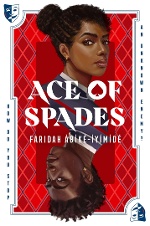Publishers' Preview: Spring 2021: Five Questions for Faridah Àbíké-Íyímídé
In Ace of Spades, someone has been sharing all-too-damaging private information about some of the students in an exclusive prep school. Can two of that someone’s victims join unlikely forces to combat their anonymous nemesis?

This interview originally appeared in the March/April 2021 Horn Book Magazine as part of the Publishers’ Previews: Spring 2021, an advertising supplement that allows participating publishers a chance to each highlight a book from its current list. They choose the books; we ask the questions.
Sponsored by

In Ace of Spades, someone has been sharing all-too-damaging private information about some of the students in an exclusive prep school. Can two of that someone’s victims join unlikely forces to combat their anonymous nemesis?
 1. Who is your most unlikely friend?
1. Who is your most unlikely friend?
Weirdly enough, my cousin. She and I were mortal enemies when we were younger; it was mostly one-sided hate, though. I’d always think of plots against her at family gatherings. Now we talk almost every day about everything. She is one of my closest friends.
2. What book turned you into a writer?
There are so many books that made me want to become a writer! One of the first books that did was The Perks of Being a Wallflower by Stephen Chbosky.
3. Did you know anyone like Chiamaka? Were you a Chiamaka?
 I went to a mostly Black all-girls Catholic school, so I definitely knew several Chiamakas — Black, popular, mean girls who probably had a lot of layers that we didn’t get to see. I think I was a Chiamaka in some ways, in the sense that I really struggled with aspects of my identity when I was younger.
I went to a mostly Black all-girls Catholic school, so I definitely knew several Chiamakas — Black, popular, mean girls who probably had a lot of layers that we didn’t get to see. I think I was a Chiamaka in some ways, in the sense that I really struggled with aspects of my identity when I was younger.
4. How do you balance gritty realism with a happy ending?
By acknowledging that while life is not all good, it is also not all bad. I think that happy endings are more powerful than bleak ones; throughout history minorities have had to overcome so much, and there is a lot of strength in acknowledging triumphs without diminishing the often-depressing realities that people have to face daily. Balancing grit with hope is me reflecting real life.
5. What’s your best piece of advice for getting out of high school alive?
I know grownups say this all the time, but most things feel so much bigger when you’re in high school. Things can feel really hopeless and never-ending, but high school isn’t forever. It’s important to remind yourself that no feeling, no situation, is forever.
Sponsored by

Photo: Joy Olugboyega.
RELATED
ALREADY A SUBSCRIBER? LOG IN
We are currently offering this content for free. Sign up now to activate your personal profile, where you can save articles for future viewing.







Add Comment :-
Be the first reader to comment.
Comment Policy:
Comment should not be empty !!!